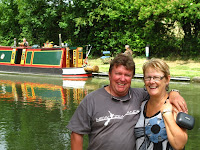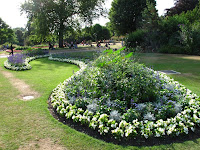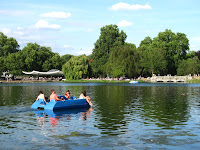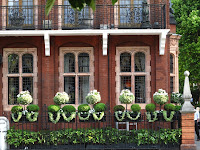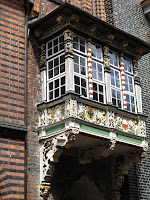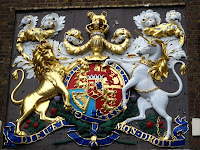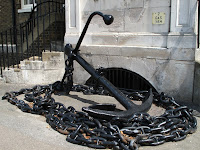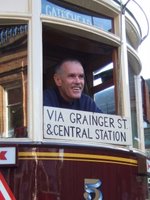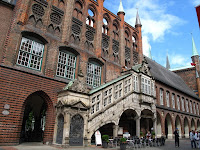
The best way to maximise a weekend in Europe is to get up before the sparrows and catch a flight at 0625 which, even with the lost hour, had us on the ground in Lubeck well before 0900,

We dropped our bag at the Hotel and set off to explore the old centre before the promised rain arrived. Unfortunately, the rain arrived a little sooner than forecast so we were forced to shelter in a cafe that served the best apple strudel in Germany and the best Florentines we have ever tried.

When there was a short pause in the rain we made a dash for the station and caught a train to Hamburg as this was our alternate wet-weather destination. The rain was just beginning in Hamburg as we arrived at the Miniatur Wunderland in the redeveloped warehouse and dock area. The Miniatur Wunderland is the world's largest model train set and is absolutely amazing.

Currently there is more than 12km of track over two floors and when completed they aim to have in excess of 20km of track. To get the “world's largest” accolade they have to be able to drive a train from one end to the other so that means the trains have to climb 6m between floors.
More than 500,000 man-hours have been spent on the model and the modellers clearly have a keen sense of humour as there are so many sight jokes to enjoy.

One could easily spend a week there and still not see all the detail there is to see. As well as trains, trams, funiculars etc there are chair-lifts, gondolas, aerial rope-ways and model ships sailing in real water with a tidal rise and fall. A working airport is the project currently under construction. There is an outdoor concert with 20000 miniature attendees and a football stadium with another 12500 cheering spectators many of whom are taking flash photos of the action on the pitch,

But the feature which really sets this model apart, and is apparently unique, is the traffic management. Cars, trucks and buses move around, brake for traffic lights, indicate for turns and circulate around the model on roads that do not have groves or tracks for them to follow, it is all very impressive,

You think you have seen it all and then you arrive at the main fire station in Knuffingen: the alarm is raised and a fleet of model fire engines and emergency vehicles rush out of the station and off to an emergency call-out. Having caught wind of this from across the model you position yourself near the “burning building” so that you can have a good look at the “action” next time.

Sure enough, after a night time sequence, the alarm is raised again and the emergency vehicles race out once more; not to the building that you are positioned by waiting for the flames and smoke to appear, but to a truck fire on the motorway on the far side of the model from where you are patiently waiting.
Click here for more pictures of the model
We had time for a quick look around the dock and warehouse area and the redevelopment that is underway and then walked back to the city centre before catching the U-bahn and train back to Lubeck.
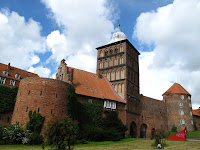

Dinner that night was in the old Sea Captains' Guildhall; possibly the oldest such building in Germany, but certainly in Lubeck. Hearty local German fare was efficiently dispensed to dinners sitting on benches at refractory tables that you shared with other patrons. It is probably quite 'friendly' if you can communicate with your randomly assigned neighbours.
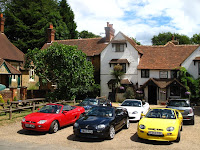 After a fun MG treasure hunt and excellent pub lunch at Abinger Hatch, we did a little exploring in the area.
After a fun MG treasure hunt and excellent pub lunch at Abinger Hatch, we did a little exploring in the area.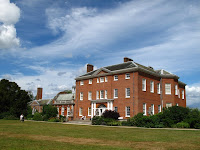
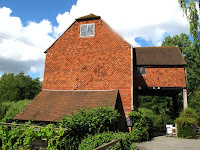 This mill is here today thanks to the fund raising efforts of the Fergusson Gang, a band of eccentric, rich yet secretive band of women who rescued the mill in the 1930s and subsequently gave it to the National Trust. This band gave three properties in all and their identities remain a secret to this day.
This mill is here today thanks to the fund raising efforts of the Fergusson Gang, a band of eccentric, rich yet secretive band of women who rescued the mill in the 1930s and subsequently gave it to the National Trust. This band gave three properties in all and their identities remain a secret to this day.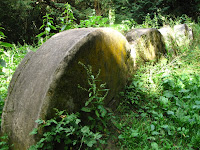 A mile or so upstream, are the abandoned gun-powder mills that were in use from 1625 to 1930. The area is tranquil enough now with streams, ponds and remnants of buildings, machinery and mills.
A mile or so upstream, are the abandoned gun-powder mills that were in use from 1625 to 1930. The area is tranquil enough now with streams, ponds and remnants of buildings, machinery and mills.
